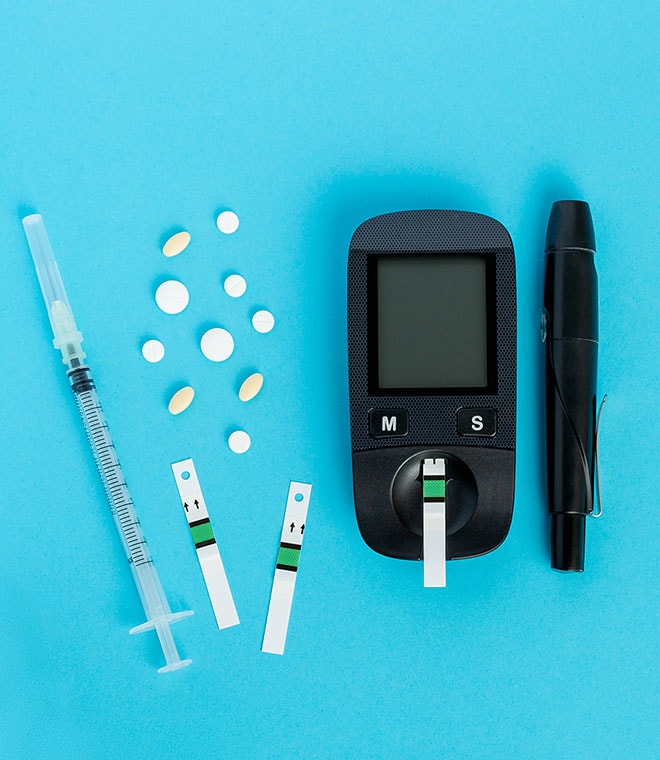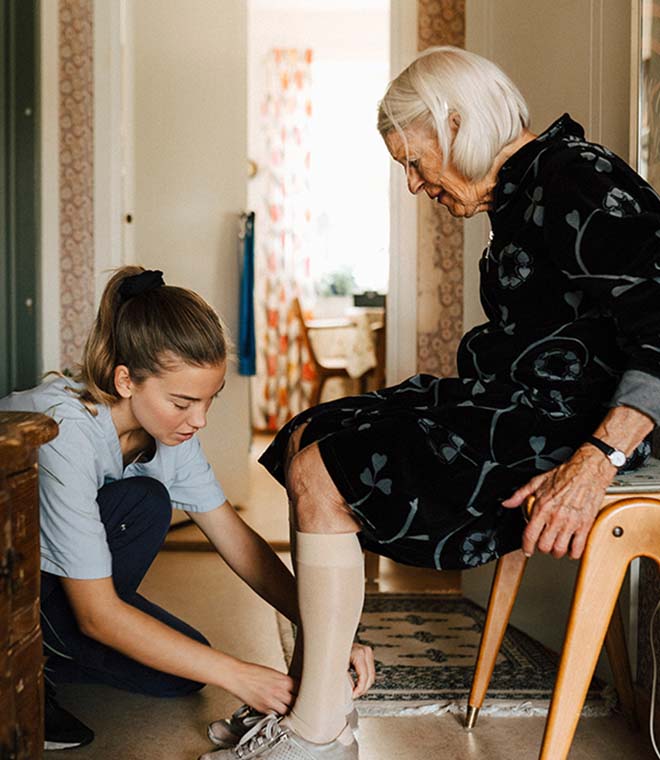Wellness
Caring for a loved one with diabetes
By Daniel Halperin Jun 01, 2022 • 9 min
Whether your loved one has type 1 or type 2 diabetes, caregivers play a crucial role in helping to manage the disease.
Diabetes treatment plans are tailored for each person and include specific instructions about everything from blood glucose (sugar) monitoring and possibly insulin injections or other diabetes medications to diet and exercise. Your loved one will follow a lifelong routine of diabetes management and may need your help to stay healthy. Caring for a person with diabetes can take work, but it can be easier with the right plan and support. Here are some ideas to help you look after your loved one—and yourself.
Dealing with the diagnosis
It's not easy to hear that you have diabetes, no matter what your age. For adults, a diagnosis may change their routines, and the disruption can threaten one's feeling of independence. For kids, it may be confusing or frightening, and parents may be scared too. If you are a caregiver, your loved one will need your support, whether you're helping a spouse take insulin or comforting a child during a blood test.
To ease your loved one's transition to life with diabetes, consider getting the whole family involved. Diabetes can mean some changes to the regular routine, so create a plan that everyone can follow together. If you're encouraging your loved one to get more active, try a daily family walk. If you're cutting back on certain foods, try out some new recipes together, and have your partner, child or parent help with the cooking, if possible.
Caring for children with diabetes
Learning your child has diabetes is overwhelming. If your child is young, a diabetes diagnosis may seem frightening to you, but if you help your child follow a consistent and structured routine, it may make long-term adherence easier. On the other hand, learning about diabetes and how to take care of it can be very difficult for kids who are older. It's important that you work closely with your child's healthcare providers so that you can learn how to help your child take care of their health.
As your child gets older, consider allowing them to be responsible for more of their care. Give them one task at a time and be ready to take responsibility back from your child if they have trouble. Let them know they will earn their independence when they have shown you they can keep up with their regular care and make smart decisions. Note that even pre-teens and teenagers need parental supervision when it comes to managing diabetes.
Keep in mind that children often experience emotional effects due to diabetes. Make sure your child understands that having diabetes isn't their fault. They may also be in denial about their condition. In this case, let them know that if they don't follow their treatment plan as directed by their healthcare providers, they can experience some very real problems. It's normal for children to feel scared. As their parent, you can help ease some of your child's concerns. For instance, if your son is scared of a finger-stick test, show him how quick and easy it can be by doing one yourself.
Children with diabetes may also feel isolated, depressed, angry or embarrassed. Listen to your child's concerns and acknowledge their feelings. Get them involved in their care and encourage them to ask their healthcare provider questions. Consider finding a support group so your child can connect with other children and families dealing with diabetes. This can help your child feel less alone and boost their confidence in managing their condition while boosting your confidence as well. Be sure to share concerns about your child's emotional health with their healthcare team, especially if your child has signs of depression, such as lasting sadness, irritability, tiredness or changes in appetite or sleep. Take heart in knowing that as your child gets used to living with diabetes, these negative feelings tend to pass.
Caring for adults with diabetes
Developing diabetes as an adult is never easy. Adults tend to have more responsibilities and established routines that are disrupted by a diabetes care regimen. Even if your loved one's diagnosis came after some warning and missed opportunities to stave off the disease, be compassionate. Instead of seeing diabetes as a punishment, take it as an opportunity to develop new, healthy habits.
Be patient with your loved one as they process their diagnosis and learn about diabetes care. Ask them what areas they truly want help with—for instance, cooking healthier at home, taking a daily walk or checking their feet daily—and focus on assisting with those tasks. Even though you mean well, try to avoid telling your loved one what to do, and instead ask them how you can help.
Caring for yourself
It doesn't take long to realize how much your life may change when someone in your family has diabetes. But even though you can't take a break from diabetes, you should still take some time for yourself. Caring for someone with diabetes can be stressful, but try not to neglect your own needs and health. Penciling in "me time" ensures that you keep a healthy balance between caring for your loved ones and caring for yourself. Set aside some time that's just for you, whether you read, take a walk by yourself or even watch TV.
Get support
At times you may feel alone in your caregiving efforts. And your partner, child or parent will also feel alone in their diabetes management. You can find support and helpful resources in many different places, both online and in person.
First, you'll have healthcare providers who can help you learn how to manage life with diabetes. Rely on them. Ask questions and build a relationship with them. In addition to doctors, nurses and certified diabetes educators, you may also want to work with a registered dietitian, fitness professional or mental health counselor to make sure all of your loved one's needs are met. You can also learn more about diabetes at our Walgreens Diabetes Answer Center, including how to manage diabetes with digital tools. Plus, you can get answers to your health questions 24 hours a day, seven days a week with our Pharmacy Chat.
If you have a child with diabetes, also work closely with schools, day care, sports teams and anyone who might be supervising your child when you're not there. Diabetes shouldn't stop your child from doing most things, but you'll want to be sure that the adults in charge know that your child may need things like breaks to test blood sugar and take insulin.
Lean on family and friends. Everyone's story is different, but with 23.1 million people diagnosed with diabetes in the United States, it may not hard be to find someone with a similar situation who can share stories and advice. Seek out support groups, and when you're ready, get active with a group like the American Diabetes Association or Juvenile Diabetes Research Foundation.
Daniel Halperin writes, edits and curates content for health and wellness resources, including diabetes.
Clinically reviewed and updated by Nancy Kupka, PhD, RN, June 2022.



